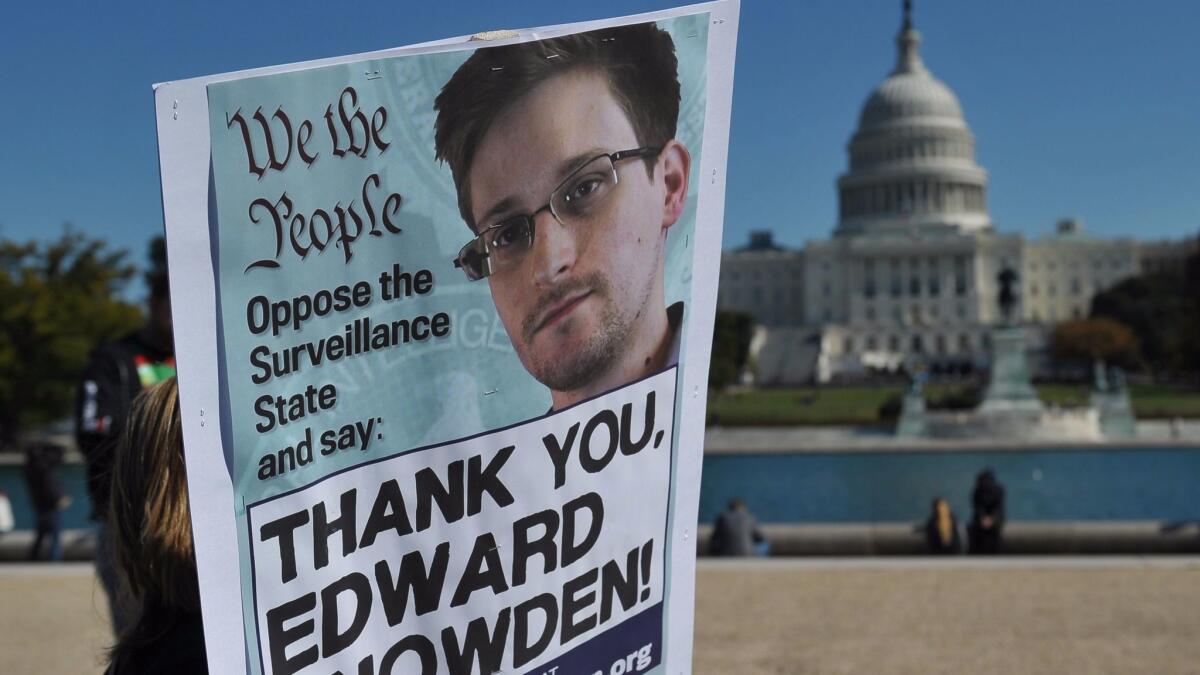Op-Ed: Trump will have wider spying powers than anything J. Edgar Hoover ever imagined

President-elect Donald Trump is about to inherit the most powerful surveillance apparatus in history. Combining unprecedented technological capabilities with a lax legal regime, his spying powers dwarf anything the notorious FBI director J. Edgar Hoover could have fathomed.
Many privacy and civil rights advocates worry Trump will seek to expand these powers further in order to spy on Muslim Americans, activists and political opponents. The truth is, he won’t have to. Because of our country’s rush to strip civil liberty protections from surveillance laws after the Sept. 11 terrorist attacks, Trump will already have all the powers he needs and more.
How did we get here? The laws that until recently safeguarded Americans from sweeping government intrusion were established in the 1970s, after a special Senate investigation revealed widespread abuses of intelligence-gathering. Almost every president dating to Franklin D. Roosevelt had a version of Richard Nixon’s infamous “enemies list,” resulting in wiretaps of congressional staffers, executive officials, lobbyists, law firms and reporters. Between 1956 and 1971, under the program dubbed COINTELPRO (short for “counterintelligence program”), the FBI routinely spied on anti-war protesters and civil rights organizations. The bureau targeted Martin Luther King Jr. with particular ferocity, bugging his hotel rooms and using the resulting evidence of infidelity to try to induce him to commit suicide.
Warnings that future administrations might be less trustworthy went unheeded. Those warnings now seem prescient.
To stem the abuses, the government implemented laws and regulations that shared a common principle: Law enforcement and intelligence agencies could not collect information on an American unless there was reason to suspect that person of wrongdoing. In some cases, this meant showing probable cause and obtaining a warrant, but even when no warrant was required, spying without any indication of criminal activity was forbidden.
The thinking was that if officials had to cite objective indications of misconduct, they wouldn’t be able to use racial bias, political grudges or other improper motives as a reason to spy on people. This logic was borne out, as government surveillance abuses went from being routine to being the occasional scandalous exception.
Then came Sept. 11. As swiftly as the principle had been established, it was rooted out. In 2002, the FBI abolished a rule barring agents from monitoring political or religious gatherings without suspicion of criminal activity. A 2007 law allowed the National Security Agency to collect calls and emails between Americans and foreign “targets” with no warrant or demonstration of wrongdoing by the American or the foreigner. Revisions to Justice Department guidelines in 2008 created a category of FBI investigation requiring no “factual predicate” — meaning no cause for suspicion. The list of erosions goes on.
The instinct to remove any restrictions on surveillance when facing a national security threat is understandable, but misguided. Dragnet surveillance does not make us safer. The massive amount of useless data collected today only obscures the real threats buried within. Even the 9/11 Commission, which issued dozens of recommendations to improve national security, did not propose surveillance without suspicion.
When privacy advocates and civil libertarians pushed Congress to restore protections, Obama administration officials said it was unnecessary because no abuse had been shown. Despite evidence that law enforcement was monitoring the Occupy and Black Lives Matter movements, lawmakers and much of the public accepted the government’s claim and continued to trust it with broad surveillance powers. Warnings that future administrations might be less trustworthy went unheeded.
Those warnings now seem prescient. Trump has specifically called for more surveillance of American Muslim communities. His pick for national security adviser, Michael Flynn, has described Islam as a “cancer,” while his nominee for attorney general, Sen. Jeff Sessions, has called the NAACP “un-American.” As a possible secretary of Homeland Security, Trump has floated Milwaukee Sheriff David Clarke, who compared Black Lives Matter to the Islamic State group and described peaceful protests against Trump as “temper tantrums” that should be “quelled.” Trump’s tendency to hold grudges is legendary: Referring to Republicans who did not support his candidacy, a Trump surrogate stated, “Trump has a long memory and we’re keeping a list.”
In short, there is every reason to fear that Trump and his administration will target people for surveillance based on religion, political activism and personal vendettas.
Having gutted legal protections against such abuses, are we powerless to stop them? No, but it will require vigilance and action from many quarters. Independent oversight entities, including inspectors general and congressional committees, must aggressively investigate how Trump uses his powers. The federal courts must shed their historical reluctance to hear lawsuits challenging government surveillance. All of us must fiercely defend journalists and whistleblowers who expose surveillance overreach.
Most important: When surveillance legislation comes before Congress — as it will in late 2017, when a key surveillance law is set to expire — lawmakers should shore up protections, not further erode them. They have bipartisan incentive. After all, politicians from both parties may be on Trump’s enemies list, too.
Elizabeth Goitein is co-director of the Liberty and National Security Program at the Brennan Center for Justice at NYU School of Law.
Follow the Opinion section on Twitter @latimesopinionand Facebook
More to Read
A cure for the common opinion
Get thought-provoking perspectives with our weekly newsletter.
You may occasionally receive promotional content from the Los Angeles Times.










